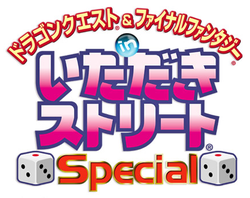Itadaki Street Special
Dragon Quest & Final Fantasy in Itadaki Street Special (ドラゴンクエスト&ファイナルファンタジー in いただきストリート Special), or simply Itadaki Street Special, was released on December 22, 2004 by Square Enix for the PlayStation 2. One to four players can play at the same time which makes this game different from its predecessors. The game features characters from Dragon Quest and Final Fantasy.
| Itadaki Street Special | |
|---|---|
| Publisher(s) | Square Enix |
| Developer(s) | Paon |
| Designer(s) | Yuji Horii |
| Artist(s) | Akira Toriyama |
| Composer(s) | Kōichi Sugiyama |
| Released | December 22, 2004 (Japan) |
| Price | ¥6,800 |
| Genre | console board game |
| Mode | single-player, multi-player |
| Platform | PlayStation 2 |
| Series | Itadaki Street |
| Rating | CERO: A (All Ages) |
| Media | DVD |
| Input | DualShock Controller |
|
|
This article is a stub. You can help by expanding it. |
Gameplay
The game is similar to Monopoly in that players roll one die to advance around a board, purchase unowned property they land on and earn money when opponents land on the player's property. The game differs from Monopoly in that players can buy and sell stocks of a block, affecting the value of block's stock up by buying or down by selling that block's stock or by developing a player owned property of that block which increases the value per share for that block's stock. Also unlike Monopoly, it is not necessary to own the entire block to develop a property, though controlling more than one property of a block allows the player to develop their properties into larger buildings to collect more from opponents when they land on them. Players must collect a set of four suits, heart, diamond, clover and spade, to level up and collect additional gold when the pass the starting position/bank. To win a player must make it back to the bank with the board's required amount, which includes the total value of the player's stocks, property value, and gold on hand.
Boards
From Dragon Quest
From Final Fantasy
- Midgar
- Castle Tycoon
- +more
Characters from Dragon Quest
Playable
- Slime
- Young Terry, as he is seen in Dragon Quest Monsters
- Prince of Cannock
- Princess of Moonbrooke
- Robbin' 'Ood
- Ragnar McRyan
- Kiryl
- Alena
- Bianca Whitaker
- Nera Briscoletti
Unlockable
- Dragonlord
- Prince of Midenhall
- Hero (Dragon Quest V)
- Hero (Dragon Quest VI)
- Hero (Dragon Quest VII)
- Jessica Albert
- Yangus
- Angelo
Other
- Hero (Dragon Quest) - appears only for use in the casino minigame Treasure Hunt.
- Torneko Taloon - appears when card 28 or 94 is picked, remaining for an unspecified number of turns, rolling the die and paying rent as he moves. If given a choice, he will move to a space where rent is higher.
- Imp - appears when card 92 or 94 is picked, remaining for an unspecified number of turns, rolling the die and moving around the board. Each property space he passes is put to sleep until his next turn, and the owners cannot collect rent should an opposing player land there.
- Bunny Girl - appears only during the casino minigame Itadaki Slot.
Characters from Final Fantasy
Playable
- Cloud Strife
- Aeris Gainsborough
- Tifa Lockhart
- Squall Leonhart
- Rinoa Heartilly
- Vivi Ornitier
- Tidus
- Yuna
- Rikku
- Paine
Unlockable
- Auron
- Moogle
- Chocobo
- Tarutaru
- Vaan
- Ashe
- Sephiroth
Other
- Eiko Carol - appears when card 91 or 94 is picked, remaining for an unspecified number of turns, rolling the die and moving around the board. Every time a player passes her, she will give them the suit of their choice, or, if the player has all four suits, then Eiko will give the player a wild card that can be used for any of the suits at a later point in the game. Players with all suits and a wild card that pass Eiko will receive another wild card.
- Ramuh
Reception and Legacy
As of August 31, 2005, the game has sold 380 thousand units in Japan. A portable version for the PSP was released. The game's success also spawned Itadaki Street DS and Fortune Street, with Mario characters more or less replacing the Final Fantasy ones.
Gallery
References
1. "Annual Report 2005". Square-Enix.com. August 31, 2005. Retrieved on 2008-12-20.
